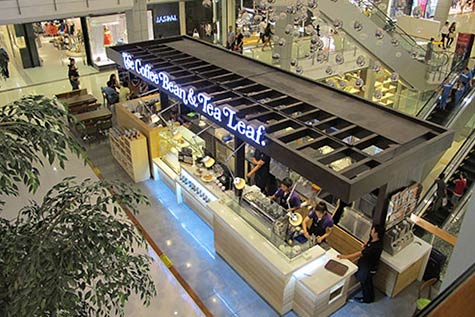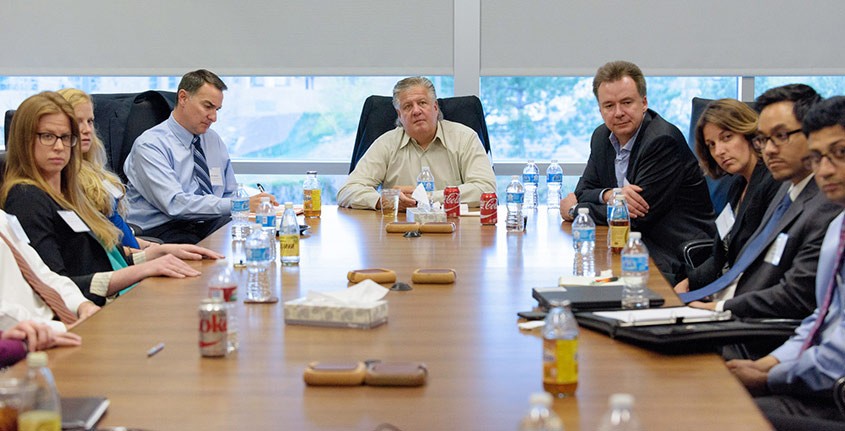Growth with an Accent
Did you know that “Gangnam Style,” the surprise hit pop song released by South Korean singer Psy in 2012, makes a big deal out of drinking coffee?
In the lyrics, Psy says he’s looking for a girl who knows how to savor a cup, and then brags that he’s the kind of guy who knocks his coffee back in one shot — while it’s still hot. The reason: Gangnam is the name of one of the biggest coffee-drinking neighborhoods — and the richest area —in Seoul, South Korea, a city where coffee consumption is booming and has become something of a status symbol.
It’s no surprise, then, that The Coffee Bean & Tea Leaf, a Southern California-based chain known to be preferred among Hollywood’s glitterati, has opened dozens of new locations across South Korea, especially in Seoul — and most especially in Gangnam.
That’s just part of the overall growth plan that’s being overseen by John Dawson, who was brought on as president and CEO of The Coffee Bean & Tea Leaf in January 2014. Dawson is both expanding the company’s already formidable presence in Southern California and pushing it into new markets in Asia, including Japan and China. And that’s on top of the company’s already significant foreign presence.
Plenty of companies would like to savor the same kind of growth. But international expansion as a pathway to growth is far from simple. For example, one recent survey of 20,000 companies doing business in 30 different countries found that, on average, foreign expansion efforts usually produced a negative return on assets five years into the expansion plan. Positive return on assets was seen only after a decade.
Why? In many cases, the companies had to spend heavily to clear legal and regulatory hurdles or broach cultural and language differences — or both. In other cases, the companies couldn’t reproduce the same supply chains they had domestically — changing their cost structures in unexpected ways.
“Growing internationally can be challenging,” Dawson says. “You can grow too fast and quickly lose sight of the fundamentals. That kind of growth becomes very expensive in the long run.”
Dawson, 51, has dealt with those kinds of challenges for more than two decades. From 2005 to 2012, he held a variety of leadership positions at Dunkin’ Brands. As the company’s global development officer, he was responsible for Dunkin’s global store development, including franchising, real estate, construction, asset management, and design. He also oversaw Dunkin’ Donuts’ expansion to the West Coast.
Before working at Dunkin’ Brands, Dawson spent 17 years at McDonald’s Corporation. As vice president of worldwide restaurant development, he was in charge of the strategic direction for McDonald’s global expansion. Dawson oversaw the establishment of the first McDonald’s in Pakistan and traveled to more than 40 countries.
But even though he’s swapped burgers and doughnuts for coffee and tea, Dawson says that many of the lessons he learned developing other brands internationally apply to his current job, and, he believes, could also apply to leaders in any organization considering foreign expansion. The following five lessons are among the ones he considers most important.

DO YOUR DUE DILIGENCE
If you’re going to open a new location in any market —even if that location is a new office down the street from headquarters — you have to research the space thoroughly. But Dawson says doing due diligence on new locations, especially overseas, is often harder than it might seem.
“Systems and processes matter when you’re expanding internationally,” Dawson says. “There’s a vast amount of coordination across disciplines that you have to master. Supply chain executives, and human resources, and the real estate divisions, and your development, and operations people all have to be part of that due diligence. You can’t leave any division out of the oversight and research process. There really isn’t a shortcut to success here.
“In my time working at McDonald’s — both opening new markets and working with existing markets — the one thing I found is that McDonald’s is very good at systems and process,” Dawson notes. “They take it very seriously.”
Part of the due diligence McDonald’s did so well and The Coffee Bean & Tea Leaf is now stressing in its expansions is working with local franchisees to make sure that those who want to join the brand are the right fit. In a non-franchise business, that same lesson might apply to the hiring of store managers or vendors, or relationships struck with any foreign company that will represent your brand to customers.
“There are plenty of people out there with money,” Dawson says. “But you have to make sure they’re also people who have the right experience. You have to really get to know them. And you have to be very clear — early and upfront — in setting expectations. That takes time. When that partnership works well, it’s great. But when it doesn’t work well, it can be very expensive and very painful for all the parties involved.”
SPEAK THE UNIVERSAL LANGUAGE OF BUSINESS
Does a barista in Los Angeles want something different than one in Kuala Lumpur, Malaysia? Not in Dawson’s experience. He says the typical Coffee Bean & Tea Leaf frontline worker wants the same thing no matter the location. “There are some universal consistencies,” he says. “Workers want steady money. They want a chance to learn. They want to develop business skills.
They want an opportunity for recognition and advancement. There are some small differences in how the reward programs are structured from market to market, but, generally, the workers have similar motivations in all markets. And I think as you go up the ranks in management, you find the same thing. A CEO of an Asian organization is dealing with the same issues that a CEO of a U.S. organization is in terms of revenues, profit, extending margins, expansion, growth, market planning. So, there may be some cultural differences you have to be sensitive to — how you greet each other, for instance — but really, once you’ve established clear and common motivations and goals, the method of conducting business is about the same.”
DON’T LET YOUR CORPORATE DNA GET LOST IN TRANSLATION
When McDonald’s expanded to India, it swapped the beef in its burgers for vegetarian options in one of the most famous examples of a U.S.-based brand adapting to the culture of a foreign market. But McDonald’s still maintained its fries, its shakes, its nuggets, and its golden arches.
“There was no confusion about the fact that McDonald’s in India was still McDonald’s,” Dawson says. “And I don’t think there is any confusion that The Coffee Bean & Tea Leaf is the same and serves the same great beverages from Los Angeles to Seoul and Manila [Philippines].”
That’s because the coffee sold to customers in San Diego is roasted from the same beans, and the tea is sourced from the same fields as what will be sold to customers in Tokyo.
Still, there are some regional differences. Some of the drinks in Asian markets are sweeter than in the U.S. markets, because that’s what customers there have said they prefer. And in Asia, some stores have full-service kitchens serving complete cafe-style meals, whereas in the U.S. food offerings feature fresh bakery and wholesome snack items.
“You have to adapt your offerings to the market, but you can’t change them wholesale,” Dawson says. “There has to be consistency. Everyone will talk to you about the localization and the tweaks you have to make, but you have to be clear about what’s going to stay consistent. That’s what gives you a relevant brand, one that people can recognize even as you go across markets. The key for taking any brand to a new market is having an established corporate DNA, really understanding that brand DNA, and committing to bringing it with you wherever you plan to grow. That’s how you ensure your culture [stays] strong, your values [stay] in place, your company DNA doesn’t get diluted, and your brand differentiation stays clear.”
LEARN FROM THEM
In Korean, coffee and tea are called keopi and cha. The Coffee Bean & Tea Leaf’s C-suite might never need to know how to pronounce those Korean words, but they are asked to know how their counterparts in foreign markets do business and to learn from them.
Although the desire to give back is universal across the system, The Coffee Bean & Tea Leaf ’s people-first culture takes on different forms across global markets. An example of this is what one Filipino franchisee is doing with a program called Brew Your Best Year. It motivates and encourages employees and customers alike to push themselves on personal development and share their stories with others. “Those are all things we’ve learned and are working to bring back here to the U.S. organization,” Dawson says. “The meaning of ‘people first’ translates universally. But the execution of it gets expressed differently. And that’s what happens when brands go international. Many of the best ideas end up coming from the international side. It’s not a one-way, top-down flow of information. It is interactive. And a strong business leader needs to recognize that.”
DON’T GROW INTERNATIONALLY JUST FOR GROWTH’S SAKE
Scan the financial headlines, and the temptation becomes obvious. Google now makes more than half its revenues doing business overseas. Most of Apple’s new stores are opening in foreign markets. Even Macy’s, long entrenched in the U.S., will open a store in Abu Dhabi, United Arab Emirates, in 2018 — its first overseas.
But the failures are there too: Target lost $2 billion on an ill-fated expansion into Canada, one it wholly abandoned this year.
That’s why John Dawson remains cautious about expansion. “Growth for growth’s sake doesn’t work when you’re talking about creating a sustained growth plan,” Dawson says. “I have had a few experiences, either working with franchisees or on the corporate side where we grew too fast. You can build a lot of sites, sure. But to operate them well and to staff them well takes a lot of work in advance and a commitment to a plan in the long run.”



